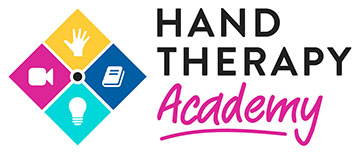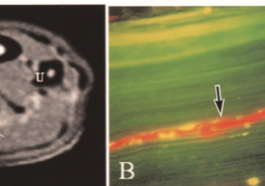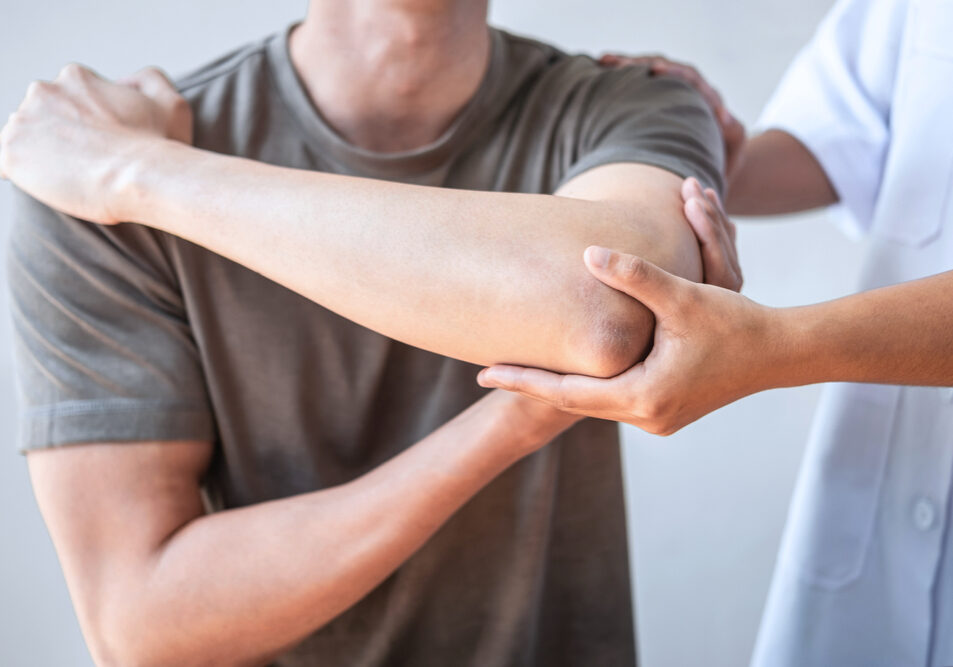Thumbs up for treating thumb pain in the hand therapy clinic
Filed under Diagnoses, Evaluation, Treatments

What do “Mommy’s thumb,” “gamer’s thumb,” and “radial styloid tenosynovitis” have in common?
- They are all officially called de Quervain’s tenosynovitis
- De Quervain’s involves the tendons within the first dorsal compartment, abductor pollicis longus (APL) and extensor pollicis brevis (EPB) and arises when the tendons are inflamed and are not able to move through the surrounding sheath smoothly causing pain, inflammation and swelling
What causes it?
- A study done by Stanford researchers in 2017 found a possible genetic marker associated with de Quervain’s tenosynovitis, indicating that individuals with this genetic polymorphism are potentially at a higher risk of developing this type of thumb tendonitis (Kim, Ahmed, Avins, & Ioannidis, 2017)
- The initial cause is unknown however repetitive use of the thumb and wrist during activities such as lifting a baby or child, opening containers and jars or texting on a phone using the thumb repetitively can initiate symptoms
- Starting a new activity that requires repetitive use of the thumb
- Can be common among pregnant women or caregivers of young children who are constantly picking a child up/holding a child
What are the symptoms?
- Swelling at the base of the thumb
- Painful popping when pulling, lifting, or opening objects/containers
- Raised cyst or nodule within the thumb area
- Pain with gripping or pinching

What kind of special tests can be used to diagnose de Quervain’s?
- Finkelstein’s / WHAT Test
- X-ray imaging is typically not needed but can be used to rule out other conditions such as arthritis or fracture
- Sonography to image the 1st dorsal compartment, this has potential benefits as it can be checked dynamically
How can we treat it?
- Gamer’s thumb treatment should aim to reduce pain and inflammation and improve the patient’s functional use of the hand and thumb
- Splints or custom orthoses can be used to immobilize and provide support to the radial side of the wrist and the thumb and are used to reduce thumb pain treatment
- Best type of custom orthosis is a thumb spica where the thumb and wrist are both stabilized during activity
- Stretching and resting the thumb and wrist can promote healing of the tendons
- Educating patients on how to avoid stress on the tendons involved such as avoiding repetitive movements with the thumb and radial side of the wrist and avoiding pinching with the thumb
- Corticosteroid injection and antiinflammatory medications may be prescribed by a medical doctor to help subside inflammation
- In severe cases, surgery may be necessary to open the sheath surrounding the inflamed tendons, releasing pressure and providing room for the tendons to glide

References
American Society for Surgery of the Hand. (2018). What is mommy’s wrist? Retrieved from http://blog.handcare.org/blog/2018/12/19/what-is-mommys-wrist/
Kim, S. K., Ahmed, M. A., Avins, A. L., & Ioannidis, J. P. A. (2017). A Genetic Marker Associated with De Quervain’s Tenosynovitis. International Journal of Sports Medicine, 38(12), 942-948. DOI: 10.1055/s-0043-116669
Mayo Clinic. (2019). De Quervain’s Tenosynovitis. Retrieved from https://www.mayoclinic.org/diseases-conditions/de-quervains-tenosynovitis/diagnosis-treatment/drc-20371337
2 Comments
Leave a Comment
More To Read
Early Mobilization After Volar Locking Plate Osteosynthesis of Distal Radius Fractures in Older Patients: A Randomized Controlled Trial
By: Rachel Reed Sørensen, T. J., Ohrt-Nissen, S., Ardensø, K. V., Laier, G. H., & Mallet, S. K. (2020). Early Mobilization After Volar Locking Plate Osteosynthesis of Distal Radial Fractures in Older Patients-A Randomized Controlled Trial. The Journal of hand surgery, S0363-5023(20)30276-8. Advance online publication. https://doi.org/10.1016/j.jhsa.2020.05.009 The Skinny: The purpose of this randomized controlled trial was…
Read MoreMechanism of Interneural Edema in Carpal and Cubital Tunnel
Mechanism of Interneural Edema Over the last few weeks I have been learning about ultrasonic imaging and carpal tunnel syndrome. When reviewing carpal tunnel syndrome, I learned that intraneural edema is a common sign of compression injuries such as carpal tunnel and cubital tunnel. There are numerous causes of carpal tunnel syndrome, and every scenario…
Read MoreEffects of different stretching techniques for improving joint range of motion.
Reference: Oba, K., Samukawa, M., Abe, Y., Suzuki, Y., Komatsuzaki, M., Kasahara, S., Ishida, T., & Tohyama, H. (2021). Effects of Intermittent and Continuous Static Stretching on Range of Motion and Musculotendinous Viscoelastic Properties Based on a Duration-Matched Protocol. International journal of environmental research and public health, 18(20), 10632. https://doi-org.libproxy.nau.edu/10.3390/ijerph182010632 The Skinny: This study used a cross-over…
Read MoreSign-up to Get Updates Straight to Your Inbox!
Sign up with us and we will send you regular blog posts on everything hand therapy, notices every time we upload new videos and tutorials, along with handout, protocols, and other useful information.






Thank you a lot for providing individuals with such a breathtaking chance to read articles and blog posts from this blog. It really is very nice and as well , full of fun for me and my office peers to visit your blog nearly thrice in one week to learn the fresh tips you will have. And indeed, I am just certainly motivated with the astounding suggestions you give. Certain 2 areas in this post are in fact the most efficient I’ve ever had.
We are so glad you and your coworkers like it all! Thanks for visiting us?